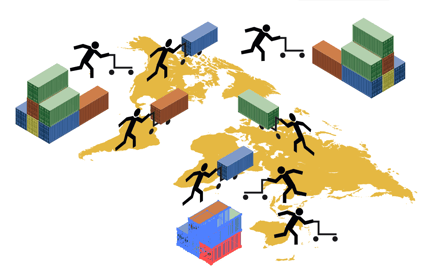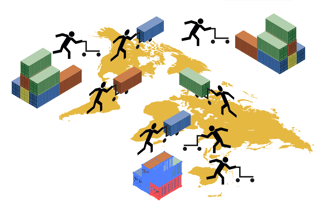Why Transport Logistics Really Matter
Nick Ostdick - August 01, 2017

 What’s one of the most undervalued elements in creating E2E supply chain visibility? It might surprise you, but this overlooked aspect of supply chain management is perhaps one of the most critical ingredients in how companies successfully move material supply to the production floor and finished products to the customer’s door. Of course, we’re talking about transportation.
What’s one of the most undervalued elements in creating E2E supply chain visibility? It might surprise you, but this overlooked aspect of supply chain management is perhaps one of the most critical ingredients in how companies successfully move material supply to the production floor and finished products to the customer’s door. Of course, we’re talking about transportation.
That’s right, transport logistics, while perhaps underutilized, is a significant driver in how manufacturing companies administer, oversee, and evaluate the overall health, sustainability, and efficiency of their supply situation. It’s somewhat difficult to understand why transport logistics often gets lost in the fray of global supply chain management. Perhaps it’s because more emphasis is placed on operations at earlier stages in the value chain such as planning and procurement. Or perhaps it’s because the facilitating of effective production programs is often at the forefront of the minds of planners and managers. Either way, transport logistics, though often neglected, can either be a significant boon or detriment to how effective a manufacturing company conducts itself.
There are several factors that can account for this, though primarily because transport logistics coincides with factors or variables often out of the control of manufacturing companies. Elements like weather delays, regional conflicts, accidents, and route detours make for great complexity in orchestrating transport logistics. Also, transport networks are often varied, vast, and include a number of players, which can also lend itself to increased complexity. As such, manufacturing companies must ask themselves a number of important questions when creating, reviewing, and adjusting their transport logistics strategy, such:
- Is the structure of my transport network the best fit for my company?
- What resources do I need to facilitate optimized transport capacity, warehousing, and distribution centers?
- What is the best way to optimize my route strategy?
- How can I ensure my shipments arrive on time given the complexity of my value stream?
These are just a handful of concerns planners and managers must address in considering their transport logistics. In order to explore the true value proposition of effective transportation platforms, let’s examine a few reasons why transport logistics really matter and how companies can leverage best practices into significant competitive advantages.
Cost reduction and optimization
Transportation is not a fixed cost element of supply chain management. As such, coordinating a transport logistics platform where planners and managers have increased visibility and transparency into the constantly shifting variables is key to reducing overall transportation costs and optimizing the output of resources and capital to ensure the best return in both efficiency and revenue. History is instructive, and manufacturing companies who can gather, sort, analyze, and review previous transportation data are better equipped to explore areas where costs can be reduced and optimized for more effective future transport planning. A transport logistics solution gives planners and managers the power to uncover areas of waste in their transportation strategy (container levels, fuel consumption, inaccurate routing processes, ineffective distribution and warehousing networks, and long lead times between warehousing and delivery) to deploy more lean methods of transportation and avoid bottlenecks or breakdowns in the transit stage of their value chain.
Integrating Industry 4.0
We’ve discussed at length on this blog about the importance of incorporating Industry 4.0 principles into a larger planning and production platform, and transport logistics are no different. Because Industry 4.0 relies heavily on intelligent solutions communicating data, reporting, and notifications in real-time, Industry 4.0 is perhaps a perfect fit for transport logistics in terms of identifying changing variables in transportation constraints and addressing these variables before they result in breakdowns or bottlenecks. In addition, because transport logistics is often reliant on a large network of partners, stages, or processes, integrating Industry 4.0 into a transport strategy is a seamless way of connecting these disparate points into a cohesive system or architecture whereby all the important players can communicate, collaborate, and respond to transport logistics events with little or no lead time. No longer are manufacturing companies operating their transport logistics strategy on outdated data or irrelevant communication threads. Today, Industry 4.0 allows these functions to take place in the moment between as many players as necessary,
Adapting to operational shifts
Imagine a certain production program is scheduled to produce X amounts of units that need to be transported to a certain distribution facility by a certain date. However, unforeseen changes to said production program means a significant reduction in the number of units, which directly impacts transport capacity. Where before a manufacturing company had budgeted enough space to move X amount of units, this reduction either means a longer lead time to when a full truck/container can be shipped, or an inefficient use of capacity whereby a half or less than half truck or container is utilized. However, a transport logistics strategy and solution gives planners and managers the power to adapt to these operational shifts by identifying the best routes, transport modes, and delivery windows to avoid incurring losses in resources and time in addressing these changing variables. In addition, a transport logistics solution allows manufacturing companies to engage in simulations and what-if scenarios to plan accordingly for such events and craft comprehensive fail-safe plans to avoid bottlenecks stemming from operational shifts.
Promoting enhanced customer/client service
The value of a transport logistics solution in enhancing customer satisfaction and service cannot be overstated. While the value proposition internally for manufacturing companies should now be quite apparent, the value externally or in a customer-facing avenue should be easily visible from the start. A company’s ability to provide the right product at the right time in the right place is paramount in driving a positive customer relations platform and increasing a company’s client base and footprint. Because a transport logistics solution provides planners and managers the power to ensure the right products arrive in the right condition at the right moment, customers will not only be more apt to work with a given manufacturing company in the future, but said manufacturing company will also create more stable and productive business relationships with partners in their supply networks.
LATEST POSTS
- Understand Circular Economy in The Manufacturing Industry
- How Can Industry 4.0 IT Integration Be Achieved Smoothly?
- The Significance of Order Sequencing in Discrete Manufacturing
- How to improve your Supply Chain Management: The Power of Control Towers
- Optimizing Human Resource Scheduling in Manufacturing: A Technological Approach



